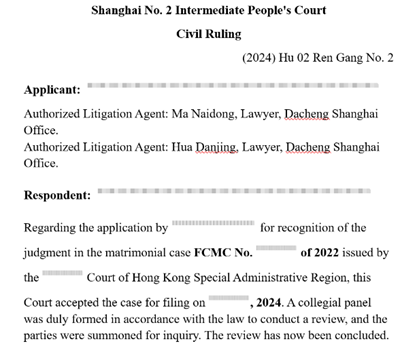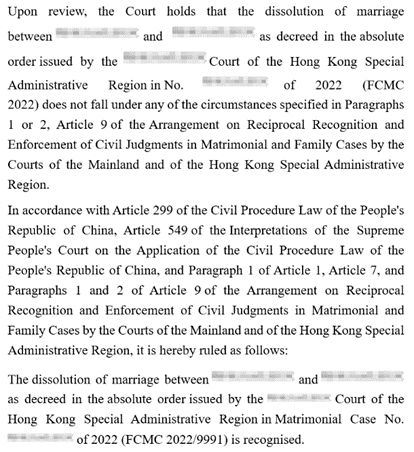Dacheng Shanghai's Pioneering Case in Recognition of HK Decree
发布日期:2025-07-17
Michael Ma Naidong (Partner), Hua Danjing (Partner), and Ni Haolin (Attorney) from Dacheng Shanghai Office recently represented a client in a groundbreaking case involving the recognition of a Hong Kong court’s decree absolute by a PRC mainland court. Their efforts also facilitated a successful settlement regarding the division of marital assets. This case represents a pioneering application of Article 9 of Arrangement on Reciprocal Recognition and Enforcement of Civil Judgments in Matrimonial and Family Cases by the Courts of the Mainland and of the Hong Kong Special Administrative Region (hereinafter referred to as the “Family Judgments Arrangement”). Notably, the team’s professional arguments—initially differing from the court’s preliminary opinion—ultimately persuaded the court to adopt the client’s position, leading to the recognition of the Hong Kong decree absolute.
At the time of engagement, the parties had initiated divorce proceedings in mainland China and Hong Kong, respectively. The mainland court first issued a judgment refusing the divorce, while the Hong Kong court subsequently granted a decree absolute and a child custody order. Since the majority of the couple’s assets were located in the mainland, the client had not sought property division in the Hong Kong proceedings—setting the stage for further disputes over marital property.
Upon taking on the case, considering that the Hong Kong court had already issued a decree absolute, the team promptly applied to the mainland court for recognition of the Hong Kong decree to prevent the opposing party from initiating parallel divorce proceedings in the mainland. However, given the scarcity of precedent cases under the Family Judgments Arrangement since its enactment, the mainland court initially interpreted Article 9.1.4 as treating the earlier mainland judgment of "divorce refusal" as constituting "a prior judgment on the same dispute by the requested court," and thus preliminarily decided to reject the application.
Faced with this hurdle, the team adopted a two-pronged approach: 1. Legal Analysis: The team presented a rigorous analysis of Article 9.1.4 to the court, contending that a "divorce refusal" judgment does not qualify as a "judgment" under the Family Judgments Arrangement. Their analysis covered the definition of "judgment", the unique nature and legal effects of a "divorce refusal" ruling, and the legislative intent behind the Family Judgments Arrangement; 2. Negotiation: Simultaneously, they engaged in settlement discussions with the opposing party regarding marital asset division, addressing potential outcomes of ongoing mainland litigation, the impact of financial contributions on asset distribution ratios, and the enforceability of a marital commitment letter signed during the marriage.
Through proactive mediation, the parties reached an early settlement on asset division, with the opposing party expressly affirming its acceptance of the Hong Kong decree absolute to the mainland court. Combining persuasive legal advocacy with a balanced consideration of both parties’ interests, the court ultimately adopted the client’s position that a "divorce refusal" judgment should not be expansively interpreted as a "judgment" under Article 9.1.4 of the Family Judgments Arrangement. The Hong Kong decree was formally recognised, securing a favourable outcome for the client.


(Judgment)
Nevertheless, it is noteworthy that in another divorce case of an entrepreneur handled by Michael Ma 's team around the same time, the conflict of divorce judgments made by the China mainland court and Hong Kong court arose again. Unlike the previous case, Hong Kong court issued decree absolute, and the mainland court issued a divorce judgment, but the Hong Kong court had accepted the case, and the decree absolute came into effect earlier than the judgment made by the mainland court. The dispute centred on whether the mainland court's subsequently issued divorce judgment constituted a scenario where "the requested court has already adjudicated the same dispute." However, the two levels of the mainland courts in this case exhibited significant divergence in their interpretation and application of the law:
The first-instance court, adhering to the principle of interregional comity, held that since the Hong Kong court's decree absolute had taken effect first, this did not fall under the circumstance where "the requested court has already adjudicated the same dispute," and thus the Hong Kong decree absolute should be recognised.
In contrast, the second-instance court ruled that the term "already adjudicated" in the legal provision should be determined based on the time when the court reviewing the recognition and enforcement application conducts its examination, rather than the chronological order in which the judgments were actually issued by the two courts. On this ground, it overturned the first-instance ruling.
The two cases handled by Ma Naidong 's team—involving jurisdictional conflicts and the validity of divorce judgments made by the mainland courts and decree absolutes of Hong Kong courts under interregional parallel litigation—highlight the interpretive and applicative disputes encountered in the judicial implementation of the Family Judgments Arrangement. These cases not only underscore the complexity and challenges inherent in cross-border divorce litigation but also test the expertise and adaptability of the teams.
Given the increasing number of PRC private enterprises listing in Hong Kong, disputes involving both mainland China and Hong Kong are expected to become more frequent. However, judicial practice currently lacks unified rules regarding jurisdictional conflicts and the recognition of matrimonial judgments between the two jurisdictions. UHNW families should reasonably anticipate such judicial uncertainties and proactively seek assistance from professional legal teams with extensive cross-border dispute resolution experience to ensure proper wealth protection planning.
律师介绍

马乃东
马乃东律师,上榜Lega500 2023私人财富管理领域特别推荐律师、荣获ALM2024年度The Asia Legal Awards 2024“年度私人客户律师”(Private Client Lawyer of the Year)提名、大成上海2016-2019年度连续4年唯一“婚姻家庭与私人财富管理专业律师”,专注于为客户提供全球化的财富保障及财富传承法律服务,在境内外的企业家等高净值人士跨国离婚与继承等家事法纠纷诉讼以及公司控制权争夺相关的公司法纠纷等方面有着丰富的法律服务经验。

华丹菁
大成上海 合伙人(备案中)danjing.hua@dentons.cn
华律师同时具有美国纽约州执业律师资格。华律师专注于企业家婚姻家庭法律服务,尤其擅长处理企业家跨境离婚、继承等复杂案件,并具备应对婚姻家庭案件衍生的民商、民刑交叉诉讼的能力。华律师在财富保障与传承规划领域也积累了丰富的经验,能为客户提供全面的法律支持和策略规划。

倪浩林
大成上海 律师haolin.ni@dentons.cn
倪律师本科毕业于华东政法大学,拥有英格兰与威尔士法律本科、硕士学位,以及心理学硕士学位。倪律师专注于为客户就高净值人士家事纠纷、公司股权投资类纠纷、经济犯罪辩护与控告等提供法律服务。
相关律师





